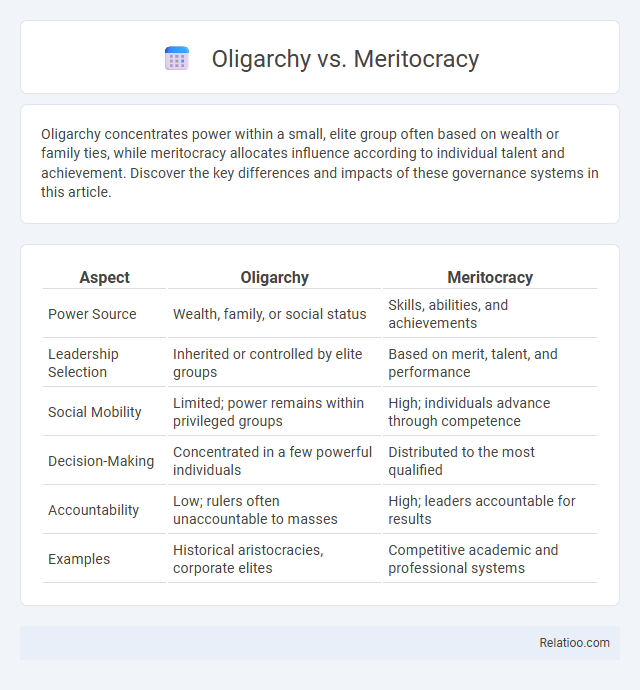Oligarchy concentrates power within a small, elite group often based on wealth or family ties, while meritocracy allocates influence according to individual talent and achievement. Discover the key differences and impacts of these governance systems in this article.
Table of Comparison
| Aspect | Oligarchy | Meritocracy |
|---|---|---|
| Power Source | Wealth, family, or social status | Skills, abilities, and achievements |
| Leadership Selection | Inherited or controlled by elite groups | Based on merit, talent, and performance |
| Social Mobility | Limited; power remains within privileged groups | High; individuals advance through competence |
| Decision-Making | Concentrated in a few powerful individuals | Distributed to the most qualified |
| Accountability | Low; rulers often unaccountable to masses | High; leaders accountable for results |
| Examples | Historical aristocracies, corporate elites | Competitive academic and professional systems |
Defining Oligarchy: Rule by the Few
Oligarchy is a form of governance where power is concentrated in the hands of a few individuals or families, often based on wealth, social status, or military control. Unlike meritocracy, which promotes leadership through demonstrated abilities and achievements, oligarchies maintain authority through inherited privilege or exclusive networks. This concentration of power can limit broader participation in decision-making processes and often leads to policies favoring the ruling elite.
Understanding Meritocracy: Power of Talent and Ability
Meritocracy is a system where power and leadership are earned through demonstrated talent, ability, and achievements rather than inherited status or wealth. This model fosters innovation and efficiency by promoting individuals based on merit, which directly impacts Your organization's success and adaptability. Understanding meritocracy helps differentiate it from oligarchy, where power is concentrated among a few elites, and broader governance frameworks that balance diverse influences.
Historical Origins of Oligarchy and Meritocracy
Oligarchy originated in ancient Greece, notably in city-states like Sparta and Athens, where power was concentrated in the hands of a few wealthy or noble families, reflecting a hierarchical social structure. Meritocracy traces its roots to Confucian China, where bureaucrats were selected through rigorous civil service examinations based on merit, promoting governance by educated and capable individuals. Governance, as a broader concept, encompasses these systems and evolves through history to balance power distribution, accountability, and administrative efficiency.
Key Characteristics: Oligarchy vs Meritocracy
Oligarchy concentrates power within a small, elite group often defined by wealth, family ties, or social status, limiting wider participation in decision-making. Meritocracy emphasizes advancement based on individual talents, skills, and achievements, promoting governance through competence and performance. Understanding these key characteristics helps you evaluate which system aligns better with your values on leadership and fairness.
Social Mobility: Opportunities in Both Systems
Oligarchies often restrict social mobility by concentrating power and resources among a select elite, limiting opportunities for the broader population. Meritocracies promote social mobility through performance-based advancement, enabling individuals to rise based on talent and achievement rather than birthright. Effective governance balances these elements by ensuring institutional fairness and equal access to education and economic resources, fostering inclusive opportunities for upward social movement.
Economic Impact: Wealth Distribution and Power
Oligarchy concentrates wealth and power in the hands of a few, leading to economic inequality and limited social mobility. Meritocracy promotes wealth distribution based on individual skills and contributions, fostering innovation and efficiency within the economy. Your understanding of governance structures shapes how economic policies influence wealth distribution and power dynamics across society.
Political Influence: Decision-Making Structures
Oligarchy concentrates political influence within a small group, often prioritizing the interests of the elite over the general population. Meritocracy bases decision-making structures on individual abilities and achievements, aiming to empower those with proven competence. Your grasp of governance highlights how different systems distribute power, shaping policy outcomes and political accountability.
Advantages of Oligarchy and Meritocracy
Oligarchy offers advantages such as efficient decision-making by a small, often experienced elite, enabling swift policy implementation and political stability. Meritocracy promotes leadership based on ability and talent, fostering innovation, competence, and fairness in governance. Both systems can enhance organizational effectiveness by leveraging expertise, though meritocracy emphasizes individual merit while oligarchy prioritizes concentrated power.
Criticisms and Challenges Faced by Each System
Oligarchy faces criticism for concentrating power in the hands of a few, often leading to corruption, lack of accountability, and suppression of dissent. Meritocracy struggles with challenges such as inherent biases in evaluating merit, perpetuating inequality, and ignoring social factors that affect individuals' opportunities. Governance systems grapple with balancing efficiency and inclusivity, confronting bureaucratic inefficiencies, and addressing disparities in representation and resource allocation.
Future Prospects: Toward Hybrid Governance Models
Future governance models increasingly explore hybrid frameworks that blend oligarchic control with meritocratic principles to balance efficiency and representation. Incorporating data-driven decision-making and transparent accountability mechanisms enhances adaptability and inclusiveness in political systems. Emerging trends suggest that such hybrid governance structures can optimize resource allocation while fostering innovation and social equity.

Infographic: Oligarchy vs Meritocracy
 relatioo.com
relatioo.com